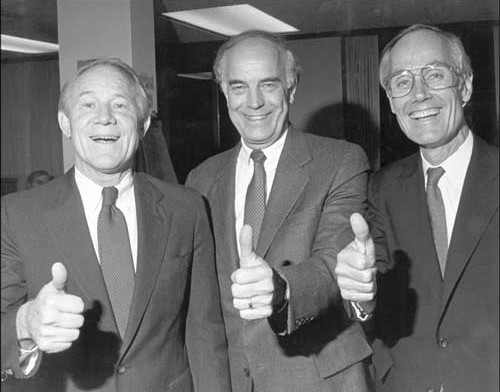
The recent public memorial for Mariners broadcaster Dave Niehaus reminded us that some sports figures transcend the deeds of the game to become larger than life to a community looking for heroes. Dave certainly was such an individual. Aside from Dave, who else qualifies? In 2008, “The Great Book of Seattle Sports Lists” (Mike Gastineau of KJR and Art Thiel and Steve Rudman of Sportspress Northwest) selected Seattle’s top sporting icons. They were:
- 5
Joe Gottstein, horseman & entrepreneur. A Seattle native and Brown University graduate, Gottstein initiated and presided over the second and longest thoroughbred racing era in state history. The Meadows, Washingtons first major race track, closed in 1903 due to an anti-gambling movement. In 1922, Gottstein lobbied the state Legislature to legalize pari-mutuel wagering, an effort that paid off in 1933 when Gov. Clarence Martin approved. The new track, Longacres, was built in just 28 days. Gottstein inaugurated one of the Northwests greatest traditions, the Longacres Mile, in 1935 and also played a major role in the formation of the Washington Horse Breeders Association. - 4
Bob Walsh, entrepreneur & promoter. Walsh, who came to Seattle in the 1970s as assistant general manager of the Sonics, organized a group of investors and civic activists to bring to the region more than 80 sports, business and cultural events during the 1980s and early 1990s. The high-profile events included the 1984, 1989 and 1995 NCAA Final Fours, the 1988-89 NCAA womens Final Fours, and the 1990 Goodwill Games, which included the largest cultural exchange (USA and USSR) in U.S. history. Walsh also orchestrated a public relations campaign in the mid-1980s that resulted in Seattle accepting a nickname change from Queen City to Emerald City. - 3
Paul Allen, Seahawks/Sounders/Blazers/owner & entrepreneur. In 1997, the Microsoft co-founder and Seattle native, who already owned the Portland Trail Blazers, exerted his greatest Seattle sports influence when he purchased the Seahawks after former owner Ken Behring threatened to move the franchise to Los Angeles, then financed a state-wide election that approved construction of Qwest Field and an exhibition center that would replace the Kingdome. His investment not only gave the Seahawks a new home by 2002, it led to the awarding in 2007 of a Major League Soccer expansion franchise to a group of Seattle investors, including Allen. - 2
Slade Gorton, politician/lawyer. The two-term Republican U.S. senator made three major interventions to save major league baseball in Seattle. When the Pilots moved to Milwaukee following the 1969 season, Gorton, as state attorney general, successfully sued the American League in 1975, which resulted in the awarding of an expansion franchise (Mariners) in 1977. In 1991 as senator, he helped force Mariners owner Jeff Smulyan to sell the club to a local group headed by Hiroshi Yamauchi of Japan, whom he solicited, rather than to Tampa Bay businessmen. In 1996, when the clubs local owners, angry with local politicians over stadium funding issues, threatened an out-of-town sale, Gorton barged in and beat up the local pols, creating a deal that completed Safeco Field, which opened in 1999. - 1
Torchy Torrance, booster and civic activist. A turn-of the-20th century baseball player at the University of Washington, Torrance was a tireless booster of all UW and Seattle athletic teams. He helped raise funds to build Husky Stadium (1920), helped Joe Gottstein launch Longacres (1933), helped acquire the land upon which Sick’s Stadium was constructed, served as executive vice president of the Triple A Seattle Rainiers (he signed pitcher Fred Hutchinson to a one-year, $2,500 contract in 1938), helped found Greater Seattle Inc., which produced the Seafair celebration, played a prominent role in recruiting Hugh McElhenny and Don Heinrich to the UW, and ran the Greater Washington Advertising Association, which helped recruit and pay athletes to attend the UW. The disclosure that the GWAA maintained a slush fund for Huskies jocks led the NCAA to place Washington on its first-ever probation in 1956.
